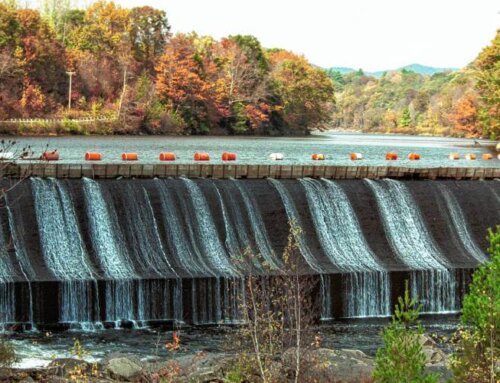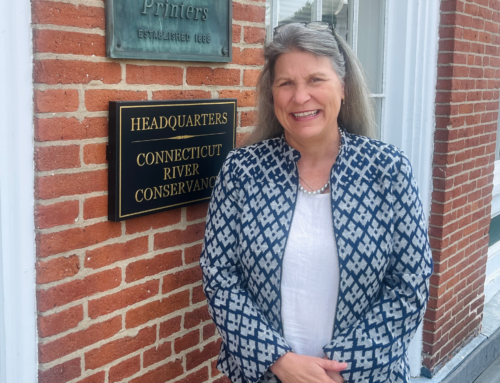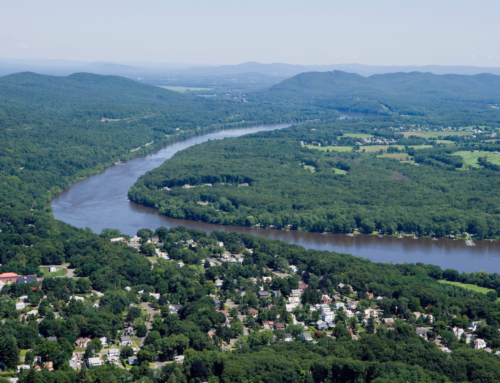This commentary is by Andrea Donlon and Kathy Urffer, who serve as River Stewards for the Connecticut River Conservancy in MA, VT, and NH.
For hundreds of years the Indigenous history of the northeast has been systematically erased. It is time to speak up to make sure that the federal government and power companies do not continue that bitter legacy.
Five hydroelectric facilities on the Connecticut River are renewing their operating licenses under the Federal Energy Regulatory Commission (FERC). Later this summer, the public will have an opportunity to weigh in on terms for these licenses that will impact more than 175 miles of the Connecticut River for the next 40-50 years. The five hydro facilities are the Wilder, Bellows Falls, and Vernon dams in VT and NH, and the Northfield Mountain Pumped Storage Project and Turners Falls dam in MA. The FERC relicensing process involves understanding and then rectifying impacts on various resources like fish passage, water quality, and recreation. One ongoing element that is consistently minimized is the impacts to traditional cultural practices of Indigenous Peoples who have been here in their homelands for thousands of years. Both hydropower companies, Great River Hydro in VT and NH and FirstLight Power in MA, were required to do a Traditional Cultural Properties (TCP) study, in addition to archaeology and historic building studies, to identify and address hydropower facility impacts to Native People’s cultural considerations. Regrettably, neither company has adequately engaged the Abenaki and other Native communities in this work.
A TCP study should look at the present, connections to the past, and consideration of the future. This includes how cultures value the exchange of life forces between fish, the water, humans, and other animals. It is not about who owns what and how much money is made, unlike some of the other studies done during relicensing. The presence of these dams over the past 200 years has damaged the river, the fishery, and many of the living beings that relate to this waterway. As an advocate for the river – all of its communities, critters and itself as a being – Connecticut River Conservancy desires the best possible outcome for the river and the people. While CRC is not in the position to speak for the Indigenous People of this place, we are able to highlight when The People are not being fairly considered in this process.
In MA, FERC told FirstLight that to be consistent with Section 106 of the National Historic Preservation Act, the company had to consult with tribal representatives before selecting an ethnographer to do the study. FirstLight did not do that. In their final application, FirstLight said they were unable to identify any TCPs because tribal representatives have “not yet agreed to meet with FirstLight’s ethnographer.” It appears that FirstLight went ahead and selected an ethnographer without first obtaining approval from the tribal representatives.
Great River Hydro (GRH) indicated in their application for the Wilder, Bellows Falls, and Vernon facilities that “No Project effects on traditional cultural properties have been identified at this time…” A complete TCP study requires consultation with the tribes. GRH created a TCP report which consisted of a collection of texts and a literature survey, but GRH has not followed through with additional outreach to the Abenaki People to complete the recommendations that were outlined in their own study – which includes actual consultation with indigenous people. GRH contends in their application that no traditional cultural properties have been identified, therefore there is no need to consider protection, mitigation, or enhancement measures for cultural concerns.
Both companies need to complete the job of reaching out to local Native tribal representatives to address the traditional cultural values of the Connecticut River in and around the hydropower projects. The Abenaki People’s current, past, and future relationship to the river and the lands and creatures that inhabit it should not be overlooked or minimized in this once in a lifetime Federal process. Comments to the Federal Energy Regulatory Commission by local communities, the states, and individuals are needed to ensure that these new licenses address the very real concerns of the original inhabitants of this land. You can learn how to speak up at ctriver.org/hydropower or https://powerofwater.fish/.
CRC will be summarizing other elements of the license application in upcoming months.







